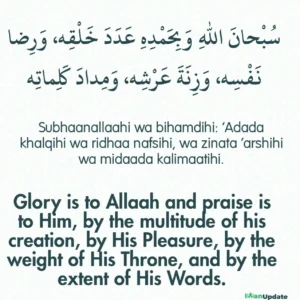Takbeer Of Eid in Arabic Text, Meaning and Transliteration

The Takbeer of Eid is one of the most significant Sunnahs observed on this joyous day. The command to proclaim Takbeer is comprehensive, encompassing various forms and formats.
As the Messenger (peace and blessings be upon him) did not specify a particular format for Takbeerat, several forms of Takbeer have been practiced by the Muslim community.
What Is Takbeer Of Eid?
Takbeer of Eid, a cherished Sunnah, refers to the proclamation of Takbeer during the days of Dhul-Hijjah, permissible from the start of the month until the 13th day. This sacred tradition is widely accepted by scholars as a Sunnah for both men and women, to be observed in various settings – mosques, homes, and marketplaces.
While men are encouraged to proclaim Takbeer aloud, women are instructed to recite it softly, adhering to the commandment to lower their voices.
By embracing this beautiful Sunnah, we can elevate our spirits and deepen our connection with Allah during this blessed period.
Eid Takbeer Arabic Text
Here is the full Eid takbir in Arabic text
اللَّهُ أَكْبَرُ اللَّهُ أَكْبَرُ لَا إلَهَ إلَّا اللَّهُ. وَاَللَّهُ أَكْبَرُ اللَّهُ أَكْبَرُ وَلِلَّهِ الْحَمْدُ
Eid Takbeer Transliteration
The transliterated wording of Eid takbir is:
Allahu Akbar, Allahu Akbar, La Ilaha Illa Allah; Allahu Akbar, Allahu Akbar, walillah Al Hamd.
Eid Takbeer in English
The Takbir of Eid in English is Allah is the Greatest, Allah is the Greatest. There is no god but Allah; Allah is the Greatest, Allah is the Greatest, and all praise is due to Allah).
This is proven from Ibn Mas‘ud (may Allah be pleased with him) and others of the early generation.
Another formula of Eid Takbir is Allahu akbaru kabira wa alhamdu Lillahi kathira wa subhan Allahi bukratan wa asila.
Meaning There is no god but Allah, Allah is most Great, Allah is most Great, much praise be to Allah and glory be to Allah at the beginning and end of the day…).
| Arabic Text | English Meaning |
| اللَّهُ أَكْبَرُ | Allah is the Greatest |
| اللَّهُ أَكْبَرُ | Allah is the Greatest |
| لَا إلَهَ إلَّا اللَّهُ | There is no god but Allah |
| وَاَللَّهُ أَكْبَرُ | Allah is the Greatest |
| اللَّهُ أَكْبَرُ | Allah is the Greatest |
| وَلِلَّهِ الْحَمْدُ | And all praise is due to Allah |
The matter is broad in scope, because the command is to say takbir in general, and the Messenger (blessings and peace of Allah be upon him) did not single out any particular format of takbirat.
Allah, may He be exalted, says (interpretation of the meaning):
“and that you must magnify Allâh [i.e. to say Takbîr (Allâhu-Akbar; Allâh is the Most Great) for having guided you.”
Surah al-Baqarah ayat 185
So one may follow the Sunnah by saying any format.

Eid Takbeer: When to Start
The time for Eid Takbeer varies depending on the type of Eid. For Eid al-Fitr, the Takbeer begins on the night before Eid and continues until the imam leads the Eid prayer. In contrast, Eid al-Adha Takbeer starts on the first day of Dhu’l-Hijjah and lasts until sunset on the final day of Tashreeq.
It’s important to note that the scope of Eid Takbeer is comprehensive, as the command is to proclaim Takbeer in general.
The Messenger (peace and blessings be upon him) did not specify a particular format for Takbeerat, leaving room for various forms of expression. This flexibility allows Muslims to embrace the spirit of Eid with joy and fervor.
The Importance of Eid Takbeer
Takbeer, proclaiming the greatness of Allah, is a vital Islamic rite. The Prophet (peace and blessings be upon him) emphasized its significance, saying, “Ornament your feasts with takbir.”
Therefore, Muslims should observe takbir on Eid day, reciting it loudly on their way to and while waiting for the Eid prayer.
The Takbeer phrase, “Allahu Akbar, Allahu Akbar, La Ilaha Illa Allah; Allahu Akbar, Walillah Al Hamd” (Allah is the Most Great, Allah is the Most Great, there is no god but Allah, Allah is the Most Great, and to Allah be praise), is a Sunnah supported by Ibn Mas`ud and Imam Ahmad.
In Surah al-Baqarah (Verse 185), Allah commands us to magnify Him through Takbeer, expressing gratitude for His guidance.
The companions and early Muslims, like Abdullah ibn Umar and Naafi’ ibn Jubayr, would recite Takbeer out loud on Eid days, emphasizing its importance.
The Salaf (early generations) would recite Takbeer from the time they left their homes until the imam led the prayer, and then again when the imam said Takbeer.
This beautiful tradition has been narrated by various scholars, including Ibn Abi Shaybah, Abdul-Razzaaq, and al-Firyaabi.
Let us revive this Sunnah and ornament our Eid celebrations with Takbeer, proclaiming Allah’s greatness and expressing our gratitude to Him.






